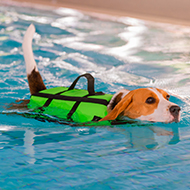Study highlights risks of early hydrotherapy following spinal surgery

The study recorded major complications in 26 dogs that had commenced hydrotherapy within five days of IVDE surgery.
Early hydrotherapy may be linked to an increased risk of postoperative complications following intervertebral disc extrusion (IVDE) surgery, according to new research.
In the study, published in the Journal of Small Animal Practice (JSAP), scientists reviewed the medical records of 83 dogs that had been treated with hemilaminectomy for acute or chronic thoracolumbar IVDE and had commenced hydrotherapy within five days of surgery.
Postoperative complications were considered major if there was a need for hospitalisation, surgery or if the dog died or was euthanised as a direct consequence of the complication. A complication was deemed minor if outpatient medical treatment was sufficient to rectify it.
Study co-author Dr Abtin Morjarradi said: “A total of 10 minor complications were recorded during the study period, including surgical site infection, diarrhoea and urinary tract infection. Major complications were recorded in 26 dogs during the study period and included euthanasia, acute dermatitis, spinal abscess and disc extrusion.
“Reasons for euthanasia were urinary incontinence, lack of neurological improvement, clinical suspicion of progressive myelomalacia, persistent pain, aggression and widespread cellulitis with an abscess caudal to the right stifle without known cause.”
JSAP editor Nicola Di Girolamo said: “Whilst previous studies indicate that early rehabilitation may be beneficial after acute spinal cord injury, the optimal timing to start hydrotherapy is unclear.
“Despite a high number of complications being recorded in the present study, it is not clear how many of these complications were directly related to the initiation time of hydrotherapy and therefore further research is required.”



 The Veterinary Medicines Directorate (VMD) is inviting applications from veterinary students to attend a one-week extramural studies (EMS) placement in July 2026.
The Veterinary Medicines Directorate (VMD) is inviting applications from veterinary students to attend a one-week extramural studies (EMS) placement in July 2026.